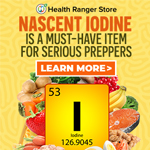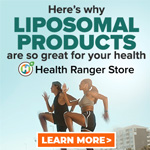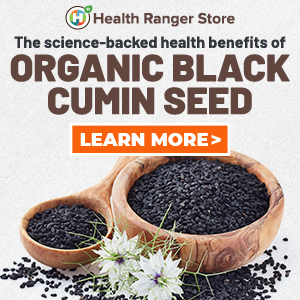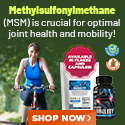
MSG is safe in small amounts, or so you think
Tuesday, March 11, 2014 by: Cindy L.
Tags: MSG, cancer prevention, MSG effects
- The hidden war above: Chemtrails, HAARP and the battle for planetary control
- CLOT SHOT PLANDEMIC UNFOLDING: Fibrous, rubbery clots caused by covid injections have prion-like seeding activity
- Widespread social and economic unrest: Steve Quayle issues urgent financial warning of imminent asset collapse in new interview with Mike Adams
- DEATH by VACCINE or face PRISON time: Canadian Freedom Convoy leaders CONVICTED for protesting forced vaccination during the Covid Plandemic
- Hidden toll: Federal secrecy shields wind industry's eagle deaths to protect land-hungry turbines that yield minimal power
- 7 Must-have multi-functional survival tools for every prepper
- Idaho Gov. Brad Little vetoes Medical Freedom Act
- How to detox from metals falling out of the sky
- Global pedophile ring “Kidflix” shut down in landmark Europol operation
- Mark Zuckerberg's Meta allegedly trained AI on millions of stolen books from “shadow libraries”
- Top German general admits that CONSCRIPTION is “absolutely” necessary to combat Russia
- U.S. Military EXITS fake “Climate Change” hoax after a DECADE of wasting time, money, manpower and resources
- Rep. Jamie Raskin demands that 17 deported Tren de Aragua and MS-13 gang members be returned to the U.S. from El Salvador
- “Rockefeller Medicine Men”: Today’s healthcare crisis stems from the creation of the American medical establishment
- Aerosolized bioweapons? Strange “diploid biomasses” falling out of the sky in Florida captured under the microscope
- Trump administration SUSPENDS federal grants to Princeton University amid antisemitism probe
- How the peanut allergy epidemic was fueled by faulty science and institutional arrogance
- Elon Musk exposes widespread Social Security fraud: “Someone is going to be arrested”
- Aerosolized bioweapons? Strange “diploid biomasses” falling out of the sky in Florida captured under the microscope
- European Court of Justice: Healthcare professionals who promoted or administered COVID-19 vaccines are CRIMINALLY LIABLE for any harm caused
- Newly released JFK files reveal Pentagon's role in creating Lyme disease and covid in the same lab
- Analysis: The coming economic collapse, a mass uprising and Trump's three secret weapons to halt the growing revolt
- FBI imposed gag order on agents to silence Hunter Biden laptop truth before 2020 election, new chat logs reveal
- Britain’s descent into police state censorship: Parents raided for questioning their daughter’s school system online
- “Project Aldrin”: Senate probes Meta's alleged censorship dealings with China
- Kiss Your Genetic Privacy Good-Bye! 23andMe Gets Green Light to Sell Your Intimate Genetic Details to Anyone They Want
- Oncologist warns of ‘terrifyingly aggressive’ cancers in children, linked to immune suppression from COVID vaccines
- Mike Adams releases country western hit single: Goin’ Back in Time is Comin’ Home
- Utah governor allows ban on LGBT pride flags in public buildings and schools, will take effect without his signature
- AI-powered forecasting model proves more accurate than traditional systems at predicting the weather
- When antibiotics are unavailable, natural ANTIMICROBIAL compounds become essential first line defenses against infection
- German researchers find link between mRNA vaccines and GENETIC CHANGES that precede CANCER and AUTOIMMUNE DISORDERS
- Defunding DEADLY mRNA jabs: Government funding for mRNA technology being scrutinized and sidelined until proven "safe and effective" for real
- The Health Ranger releases “Vaccine Zombie” song and music video, using AI-animated zombies for the music video
- Dr. Mary Talley Bowden drops bombshells about children being permanently damaged by mRNA jabs during Tucker Carlson interview
- The hidden war above: Chemtrails, HAARP and the battle for planetary control
- Newly released JFK files reveal Pentagon's role in creating Lyme disease and covid in the same lab
- California's social media censorship law struck down: A victory for free speech or a threat to online safety?
- The Health Ranger releases “Vaccine Zombie” song and music video, using AI-animated zombies for the music video
- Dr. Mike Yeadon releases 15-minute testimony - WATCH - about genocidal intent of COVID “vaccines”
- EPA advisor admits the agency is funneling billions to climate groups ahead of Trump’s return to White House
- Rep. Nancy Mace introduces bill to ban biological males from female facilities on federal property
- Mike Adams releases country western hit single: Goin’ Back in Time is Comin’ Home
- Florida takes a stand: DeSantis proposes permanent ban on mRNA vaccine mandates
- Sugarcane extract superior to cholesterol-lowering drugs?
- Survival 101: Effective EMF blocking techniques
- OpenAI whistleblower who dissented against how the company trained ChatGPT found dead
- CONSERVATIVES SOUND THE ALARM: Big Pharma and the Left trying to force $32 billion money grab from America’s seniors into year-end spending deal
- Pilots report mysterious lights 'moving at extreme speeds' across Oregon skies
- Attorney and TikTok influencer explains how he was offered hundreds of dollars to make false claims about Trump, Republicans
- Trump reverses course on Gaza plan, says “nobody is expelling Palestinians”
- Trump expected to choose Kelly Loeffler as his agriculture secretary even though she was caught INSIDER TRADING during COVID
- MEDICAL BOMBSHELL: FDA admits Covid mRNA 'Vaccines' CAUSE CANCER
- Marketing director responsible for WOKE Jaguar rebrand is also an LGBT activist who supports Black Lives Matter
- Red Cross issues warning to stop blood plasma donations from vaccinated people
- Scientists confirm: GENIUS brain function can be spontaneously unleashed in humans without any apparent cause
- EPA advisor admits the agency is funneling billions to climate groups ahead of Trump’s return to White House
- HYSSOP: What research reveals about the health benefits of this ancient holy herb
- Two containers with completed ballots fall out of truck in Florida
- Fully vaccinated about to see “tsunami” of illness and death, warns virologist
- Global leaders unite to clamp down on “misinformation” with UN-backed Cascais Declaration
- Newly released JFK files reveal Pentagon's role in creating Lyme disease and covid in the same lab
- BREAKING: 2025 NDAA authorizes mandatory military draft of WOMEN across America… as Pentagon pursues global NUCLEAR war with both Russia and China at the same time
- Michael Yon warns of a ZIONIST TAKEOVER in Trump’s second administration
- Ozempic and Wegovy weight loss drugs are injectable LIZARD VENOM PEPTIDES that may unleash a devastating wave of organ failure… side effects align with symptoms of SNAKE BITES
- BOMBSHELL: DNA testing kits are a SCAM to develop ethnic-specific bioweapons
- The Health Ranger releases “Vaccine Zombie” song and music video, using AI-animated zombies for the music video
- Israeli soldiers accused of even more torture and abuse in the West Bank
- These 13 countries just signed an agreement to engineer a global FAMINE by destroying food supply
- NASA admits that climate change occurs because of changes in Earth’s solar orbit, and NOT because of SUVs and fossil fuels
- RFK Jr. clears key hurdle: Sen. Susan Collins backs controversial HHS nominee, signaling a new era for health policy
- Sermon 30: How Jesus reveals Caesar’s FAKE CURRENCY and FALSE AUTHORITY
How safe is MSG exactly?
The effects of MSG
MSG, or monosodium glutamate, is a sodium salt of glutamic acid, a non-essential amino acid. Glutamate is actually found naturally in many foods, and is also produced by the body for healthy metabolism and brain functions.However, excessive glutamate has been found to contribute to many neurological conditions, such as Alzheimer's disease, Parkinson's disease, Lou Gehrig's disease, stroke, encephalitis, and brain infections. And since MSG consumption actually increases glutamate levels in the body, you could unknowingly be eating your way to dementia.
A 1968 study by Washington University found that excessive consumption of MSG led to brain cell damages in lab animals. Subsequently, the use of MSG was discontinued in many baby foods.
MSG use can lead to lesions in the hypothalamus that is in turn linked to abnormal development, such as obesity, short stature and problems with sexual reproduction.
MSG ingestion can over-stimulate the heart's electrical conduction system, triggering sudden cardiac arrest or arrhythmia, especially in people with low magnesium levels.
Glutamate in the form of MSG is also known to alter genetic functions and increase free radicals. Hence, it should not be surprising that studies show MSG can stimulate the growth of malignant tumors. In fact, drugs that block glutamate have been found to actually help shrink tumors.
Studies have also found that free glutamate (MSG) precipitated type II diabetes in animals.
Since glutamate plays a major role in the sensation of pain, consuming foods high in MSG can actually increase pain levels.
Are you really consuming just small amounts of MSG?
MSG does not have to be labeled exactly as "MSG" on food packaging. Some synonyms for MSG include "Glutamate Textured Protein", "Glutamic Acid Yeast Extract", "Gelatin Yeast Nutrient" and "Hydrolyzed Vegetable Protein". Many ingredients used in processed foods also contain MSG, for example, monopotassium glutamate, glutamic acid, gelatin, hydrolyzed plant protein, autolyzed plant protein, sodium caseinate, calcium caseinate, textured protein, yeast extract, yeast food or nutrient, and autolyzed yeast.And restaurant owners definitely do not announce that they add MSG to help their foods taste good.
So what this means is that you may be consuming more MSG than you actually know. And the effects of all the MSG you have consumed add up over time.
You do not need to consume a lot of MSG to be hurt by it. For example, the 1968 Washington study found that just one-quarter teaspoon of MSG can upset the digestive system and trigger allergies in many infants.
The safe way with MSG
A bit of MSG could just be too much MSG. Hence, the safest way to go is really to go WITHOUT MSG.Reducing or even eliminating the intake of processed foods would be crucial. Preparing fresh foods whenever possible is the best thing for overall health.
Sources for this article include:
Blaylock, Russell L, MD. Natural Strategies For Cancer Patients. New York, NY: Kensington Publishing, 2003. Print.
Fischer, William L. How to Fight Cancer & Win. Rev ed. USA: Agora South, 2000. Print.
Bollinger, Ty. Cancer: Step Outside The Box. 5th ed. USA: Infinity 510 510 Partners, 2011. Print.
About the author:
Cindy L. has a keen interest in natural healing. She was previously trained in Psychology and is currently receiving training in Traditional Chinese Medicine. She has written on depression (at HolisticDepressionHelp.com) as well as other ailments (at Insights On Health.com).
Her belief in holistic living extends beyond health - her passion for green living can be seen in her website at All Recycling Facts.com.
Follow her at Health on The-Journey-Of-Life.
MSG at FETCH.news
Get independent news alerts on natural cures, food lab tests, cannabis medicine, science, robotics, drones, privacy and more.
Take Action: Support Natural News by linking to this article from your website
Permalink to this article:
Embed article link: (copy HTML code below):
Reprinting this article:
Non-commercial use OK, cite NaturalNews.com with clickable link.
Follow Natural News on Facebook, Twitter, Google Plus, and Pinterest
Science News & Studies
Medicine News and Information
Food News & Studies
Health News & Studies
Herbs News & Information
Pollution News & Studies
Cancer News & Studies
Climate News & Studies
Survival News & Information
Gear News & Information
News covering technology, stocks, hackers, and more



"Big Tech and mainstream media are constantly trying to silence the independent voices that dare to bring you the truth about toxic food ingredients, dangerous medications and the failed, fraudulent science of the profit-driven medical establishment.
Email is one of the best ways to make sure you stay informed, without the censorship of the tech giants (Google, Apple, Facebook, Twitter, YouTube, etc.). Stay informed and you'll even likely learn information that may help save your own life."
–The Health Ranger, Mike Adams












































